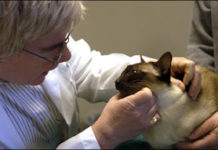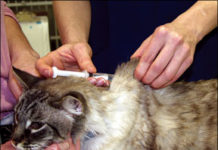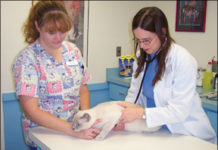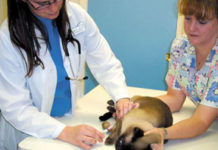Pursuing a Cure for Breast Cancer
Eighty to 90 percent of mammary tumors in cats are cancerous and can spread as rapidly as aggressive breast cancer does in humans. Researchers at the Cornell University College of Veterinary Medicine are hoping to improve treatment of mammary adenocarcinomas, with the long-term goal of a cure. Their pioneering focus: the role of stem cells in the disease. Gerlinde Van de Walle, DVM, Ph.D., Assistant Professor of viral pathogenesis and stem cell biology at Cornell’s Baker Institute for Animal Health, is working to identify adult mammary stem cells (MaSC) in both healthy and malignant feline and canine mammary gland tissues.
Targeted Radiation Studied as Therapy for Oral Cancer
Treatment of oral squamous cell carcinomas (OSCC) has traditionally relied upon surgery, chemotherapy and/or radiation — with disappointing results. Cats with the rapidly spreading cancer, which accounts for 10 percent of all feline tumors, suffer pain when eating, drinking, grooming and breathing. Many are in such distress that they are euthanized.
Short Takes: July 2012
Lymphoma is the most common cancer diagnosed in cats, and while several prognostic factors have been documented, another factor recently considered to be important is weight loss. Body weight over time may be a simple, objective and useful marker of patient status.
Ways You Can Combat Feline Cancer
An estimated two percent of the 80 million or more cats now living in the United States will at some point develop cancer, a disease marked by the uncontrolled proliferation of cells on or within an animal’s hard and soft body tissues. Thanks to dramatic advances in veterinary medicine, many types of feline cancer are manageable — sometimes even reversible — if the condition is recognized early in its development and the affected cat is treated promptly and appropriately. But any cancer that remains undetected and untreated until it has reached an advanced stage is very likely to prove fatal.
Risk of Vaccine-Associated Sarcomas
Due to the demonstrable effectiveness of vaccines in preventing a wide variety of infectious feline diseases, veterinarians used to recommend that every cat be injected every year with every available vaccine. In the past two decades or so, however, this approach to preventive therapy has come into question for several reasons.Although the vaccine safety and efficacy record is very good overall, it has now become clear that vaccination can sometimes lead to clinical disease. It is remotely possible for vaccines to damage developing fetuses in pregnant cats or to stimulate allergic reactions, and for improperly placed injections to cause severe nerve injury. And although uncommon, vaccines and the equipment used to administer them, if poorly maintained or stored, can become contaminated with infectious agents that can be transmitted by injection.
Short Takes: June 2011
Based on data in the Veterinary Medical Database (VMDB), 1,129 feline intestinal tumor patients between 1964 and 2004 were evaluated for inclusion in an epidemiologic study. Cases were analyzed by breed, age, year of diagnosis, tumor type and tumor location. (Note: Feline intestinal tumors are relatively uncommon and the incidence of all intestinal tumors for this 40-year time period was 0.4 percent.)
Squamous Cell Cancer: Dangerous
During your cats routine physical exam, youre likely to observe the veterinarian carefully studying the animals face, gently stroking its nose, and fondling its ears. This is not merely a show of affection. Rather, the veterinarian may be searching for tiny, scabby sores on the cats skin that could indicate the presence of squamous cell carcinoma (SCC) - a skin cancer that, if caught in its early stage, will most likely be harmless and easily treated. If the skin eruptions go unnoticed, however, the cancer can progress, spread to other parts of the body and ultimately prove fatal.
Combat Feline Cancer
An estimated two percent of the 80 million or more cats now living in the United States will at some point in their lives develop cancer, a disease marked by the uncontrolled proliferation of cells on or within an animals hard and soft body tissues. Thanks to dramatic advances in veterinary medicine, many types of feline cancer are manageable - sometimes even reversible - if the condition is recognized early in its development and the affected cat is treated promptly and appropriately. But any cancer that remains undetected and untreated until it has reached an advanced stage is very likely to prove fatal. The task of diagnosing and treating feline cancer falls, of course, to the expert veterinary oncologist. Owners, however, can play a significant role in spotting a cancerous lesion at its earliest stage of development, when it is most amenable to treatment. Indeed, there are measures that a cat owner can take to prevent certain types of feline cancer or at least to minimize the risk of their occurrence.
Prevent Mammary Cancer
If you have your female cat spayed at an early age, you will, of course, be preventing her from experiencing motherhood. Nevertheless, youd be wise to have her undergo the procedure, since youll also be dramatically lessening the chances that she will be afflicted with mammary cancer later in her life (not to mention helping to curb feline overpopulation). Indeed, says Margaret McEntee, DVM, an associate professor of oncology at Cornell Universitys College of Veterinary Medicine, having your cat spayed at six months of age will reduce her chances of getting mammary cancer by about 90 percent.
Collars for Cancer Research
The statistics are sobering: Each year, according to the National Cancer Institute, approximately six million companion cats in the United States will be diagnosed with cancer, and more than half of cats over the age of 10 will die of the dreaded disease. A cure for feline cancer may be just a collar away. Bright orange Pet4Pets charity collars - similar to the popular cancer-awareness wrist bands, la Lance Armstrong - were introduced last spring, with the funds going toward groundbreaking cancer research being funded by the Animal Cancer Foundation (ACF) in Norwalk, Connecticut.
Understanding Feline Tumors
Cats come in a wide variety of shapes and sizes, and the range of their behavioral characteristics is similarly broad. The same can be said about the array of tumors (neoplasms) that can develop within the feline body. Some are small, others are large; some naturally tend to pass the time quietly ensconced in one spot, while others are destined to roam; some are benign by nature, while others behave very badly indeed, causing no end of damage.
Vaccine-Associated Sarcomas
One suggestion on prevention: Give your cat only the vaccines that it really needs. Heres why.














